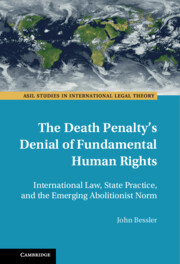 The Death Penalty's Denial of Fundamental Human Rights
The Death Penalty's Denial of Fundamental Human Rights Published online by Cambridge University Press: 01 December 2022
The Introduction gives a snapshot of the current status of capital punishment around the globe. It gives current statistics from Amnesty International and describes Amnesty International's anti-death penalty campaign in the 1970s that led to the Declaration of Stockholm, which expressed "total and unconditional opposition to the death penalty." The Introduction describes the divide between retentionist and abolitionist countries, highlighting countries that have outlawed capital punishment in their constitutions or through judicial rulings. After detailing how the death penalty was traditionally seen as something other than torture, the Introduction discusses the law's evolving nature--and how the death penalty is increasingly seen as a torturous and cruel punishment that violates human dignity and fundamental human rights. Noting that death sentences are no longer treated as a "lawful sanction" in many locales, the Introduction describes how the U.N. General Assembly has voted on multiple occasions for a global moratorium on executions. The Introduction summarizes the current state of international law as regards capital punishment and previews the book's content.
To save this book to your Kindle, first ensure no-reply@cambridge.org is added to your Approved Personal Document E-mail List under your Personal Document Settings on the Manage Your Content and Devices page of your Amazon account. Then enter the ‘name’ part of your Kindle email address below. Find out more about saving to your Kindle.
Note you can select to save to either the @free.kindle.com or @kindle.com variations. ‘@free.kindle.com’ emails are free but can only be saved to your device when it is connected to wi-fi. ‘@kindle.com’ emails can be delivered even when you are not connected to wi-fi, but note that service fees apply.
Find out more about the Kindle Personal Document Service.
To save content items to your account, please confirm that you agree to abide by our usage policies. If this is the first time you use this feature, you will be asked to authorise Cambridge Core to connect with your account. Find out more about saving content to Dropbox.
To save content items to your account, please confirm that you agree to abide by our usage policies. If this is the first time you use this feature, you will be asked to authorise Cambridge Core to connect with your account. Find out more about saving content to Google Drive.